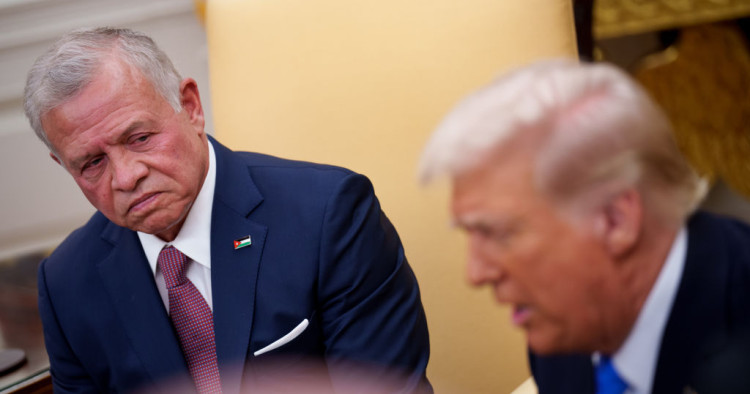President Donald Trump continues to double down on his out-of-left-field proposal to take over the Gaza Strip, remove the two million Palestinians who live there, and turn it into the world’s largest beach resort. During the press gaggle on Feb. 11, before his meeting with Jordan’s King Abdullah II, whom Trump is pressuring to accept some of those Palestinians he is proposing to relocate, the president said, “We will have Gaza… We are going to take it. We are going to hold it.”
Every bit of evidence indicates that the Gaza idea originated with Trump himself and had not been vetted, or even discussed, with the agencies of the government that would have the responsibility to carry it out. The logistics alone make the proposal extremely unlikely to ever be implemented, to say nothing of the international legal and domestic financial obstacles. And what does a Gaza adventure have to do with “America First”? There must be some reason that the US president continues to push, in a very public way, a policy that has no chance of happening, much less succeeding.
That reason appears to have everything to do with Trump’s desire to get the oil-wealthy Arab states of the Persian Gulf to fund the reconstruction of Gaza and to push the most important of those states, Saudi Arabia, to recognize Israel and join the Abraham Accords. The logic is simple: Threaten to do something outlandish to a target’s friends and allies. Tell the target that you will back away from that outlandish thing if only it takes some very simple and easy steps that the threatener desires. This dynamic is the plot of countless American gangster movies, a genre with which Trump is surely more than familiar.
One can imagine the conversations Trump is having and will have with the Gulf leaders: You do not want me to push all the Palestinians out of Gaza? OK, pony up to rebuild the place and, while you are at it, make sure that Hamas is not in control there. To the Saudis, he will say that it will be easier to get the Gaza job done if they establish diplomatic relations with Israel. Palestinian state? We can talk about that later, once you finish the Gaza job. Not interested in playing ball? OK, get ready for all those Palestinians to come flooding into Egypt and Jordan, with all the consequences for regional stability that might bring.
Does this sound far-fetched? Consider that a version of this strategy preceded the United Arab Emirates’ recognition of Israel in the summer of 2020. With the failure of the first Trump administration’s “Deal of the Century” to solve the Palestinian-Israeli conflict, Israeli Prime Minister Benjamin Netanyahu publicly stated his intention to annex a substantial part of the West Bank. Would he have done it? Maybe. But it might also have been a bluff. Emirati leader Mohammed bin Zayed required Netanyahu to give up on the annexation “plan” as a condition of recognition. Netanyahu agreed. The UAE could argue it saved the Palestinian cause from a threat that might or might not have been real.
If this logic worked once on an Arab Gulf state during the first Trump administration, it might not be so unusual for the US president to think that it could work again. Prime Minister Netanyahu is playing his part in the gambit, even suggesting that there could be a Palestinian state on Saudi territory. The problem with this approach is twofold: Saudi Arabia is not the UAE, and the regional situation in 2025 is not what it was in 2020.
Saudi Arabia sees itself as a leader of the Arab and Muslim worlds. Trading its highest card vis-à-vis Israel, diplomatic recognition, for something intangible, a promise by the US not to do something it is highly unlikely to do anyway, is too high a price for a regional leader to pay. Riyadh has repeatedly said since the beginning of the Gaza war that formal engagement with Israel requires a guaranteed timeline to Palestinian statehood.
Moreover, the security challenges facing the Gulf states in 2020 were much different than they are now. Then, Iran was riding high in regional politics, with dominant influence in Lebanon, Syria, Iraq, and Yemen and a strong foothold in Palestinian politics through its relationship with Hamas. Diplomatic relations with Israel provided an avenue for greater defense cooperation against Iran and pleased an American administration that was, in the end, the ultimate guarantor of Gulf states’ security. Now, with Iran severely weakened by its setbacks in Gaza, Lebanon, and Syria, the importance for Saudi Arabia and other Gulf states of military and diplomatic cooperation with Israel is much reduced. Riyadh in 2023 re-established diplomatic relations with Iran, through Chinese mediation. It is looking for a less confrontational, more stable Gulf that will be attractive for the foreign investment it seeks as part of its ambitious plans to lessen the Saudi economy’s dependence on oil exports.
If Trump is running a bluff against the Saudis and other Gulf oil producers with his Gaza proposal, chances are he will find his targets much less likely to fold than he thinks.
F. Gregory Gause, III, is a Visiting Scholar at the Middle East Institute. He is also a professor emeritus of international affairs at the Bush School of Government and Public Service, Texas A&M University.
Photo by Andrew Harnik/Getty Images
The Middle East Institute (MEI) is an independent, non-partisan, non-for-profit, educational organization. It does not engage in advocacy and its scholars’ opinions are their own. MEI welcomes financial donations, but retains sole editorial control over its work and its publications reflect only the authors’ views. For a listing of MEI donors, please click here.













